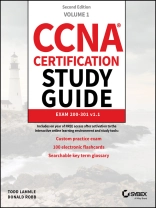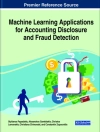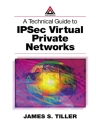Your comprehensive guide to succeeding on the UPDATED CCNA Certification exam
In the newly revised second edition of the CCNA Certification Study Guide Volume 1: Exam 200-301 v1.1, celebrated Cisco educator and network guru Todd Lammle and expert Donald Robb deliver an intuitive and efficient roadmap to the challenging CCNA Certification test. The updated Study Guide covers many topics, including network fundamentals and access, IP connectivity and services, security fundamentals, automation, programmability, artificial intelligence, and more.
The CCNA Certification Study Guide comes with complementary access to a robust set of online study tools designed to assess and advance your exam readiness.
You’ll find:
- Up-to-date information relevant to the latest Cisco technologies and job roles
- An interactive online test bank, including hundreds of practice test questions, flashcards, and a glossary of key terms and definitions
- Discussions of everything from VLANs and Inter-VLAN Routing to switching, OSPF, IP routing, and more
Perfect for anyone preparing to pursue the updated CCNA Certification, the CCNA Certification Study Guide Volume 1: Exam 200-301 v1.1, Second Editon, is a must-read for practicing IT professionals looking for a refresher on Cisco networking fundamentals.
Содержание
Introduction xxi
Assessment Test xxxv
Chapter 1 Network Fundamentals 1
Network Components 2
LANs and SOHOs 2
Routers and Switches 3
Next-Generation Firewalls and IPS 6
Network Topology Architectures 10
The Cisco Three-Layer Hierarchical Model (Three-Tier) 10
Collapsed Core (Two-Tier) 13
Spine-Leaf 14
Wide Area Networks 15
Defining WAN Terms 16
WAN Connection Bandwidth 17
Summary 18
Exam Essentials 18
Written Lab 19
Review Questions 20
Chapter 2 Ethernet Networking 23
Ethernet Networks in Review 24
Collision Domain 25
Broadcast Domains 26
Csma/cd 27
Half- and Full-Duplex Ethernet 29
Ethernet at the Data Link Layer 31
Ethernet at the Physical Layer 37
Ethernet Cabling 40
Categories of Ethernet Cables 41
Straight-Through Cable 42
Crossover Cable 42
Rolled Cable 44
Fiber-Optic 47
Power over Ethernet (802.3af, 802.3at) 48
Summary 48
Exam Essentials 49
Written Labs 50
Written Lab 2.1: Binary/Decimal/Hexadecimal Conversion 50
Written Lab 2.2: CSMA/CD Operations 54
Written Lab 2.3: Cabling 54
Review Questions 55
Chapter 3 Tcp/ip 61
Introducing TCP/IP 62
A Brief History of TCP/IP 62
TCP/IP and the Do D Model 63
The Process/Application Layer Protocols 65
The Host-to-Host or Transport Layer Protocols 74
The Internet Layer Protocols 84
IP Addressing 92
IP Terminology 92
The Hierarchical IP Addressing Scheme 93
Private IP Addresses (RFC 1918) 98
IPv4 Address Types 99
Layer 2 Broadcasts 100
Layer 3 Broadcasts 100
Unicast Address 101
Multicast Address 102
Summary 103
Exam Essentials 103
Written Labs 105
Written Lab 3.1: TCP/IP 105
Written Lab 3.2: Mapping Applications to the Do D Model 105
Review Questions 107
Chapter 4 Easy Subnetting 111
Subnetting Basics 112
How to Create Subnets 113
Subnet Masks 114
Classless Inter-Domain Routing (CIDR) 116
IP Subnet-Zero 117
Subnetting Class C Addresses 118
Subnetting Class B Addresses 130
Summary 138
Exam Essentials 139
Written Labs 139
Written Lab 4.1: Written Subnet Practice # 1 139
Written Lab 4.2: Written Subnet Practice # 2 140
Written Lab 4.3: Written Subnet Practice # 3 141
Review Questions 142
Chapter 5 Troubleshooting IP Addressing 147
Endpoint Overview 148
Desktops/Laptops 148
Mobile Phones/Tablets 148
Access Points 149
IP Phones 149
Internet of Things 149
Servers 149
Server Roles 150
Cisco’s Way of Troubleshooting IP 151
Verify IP Parameters for Operating Systems 153
Determining IP Address Problems 154
Summary 159
Exam Essentials 159
Written Lab 160
Review Questions 161
Chapter 6 Cisco’s Internetworking Operating System (IOS) 163
The IOS User Interface 164
Cisco IOS 165
Connecting to a Cisco IOS Device 165
Bringing Up a Switch 167
Command-Line Interface 167
Entering the cli 168
Overview of Router Modes 168
cli Prompts 169
Editing and Help Features 171
Administrative Configurations 176
Hostnames 177
Banners 177
Setting Passwords 179
Encrypting Your Passwords 185
Descriptions 187
Router and Switch Interfaces 189
Bringing Up an Interface 192
Viewing, Saving, and Erasing Configurations 198
Deleting the Configuration and Reloading the Device 200
Verifying Your Configuration 200
Summary 213
Exam Essentials 214
Written Lab 217
Review Questions 218
Chapter 7 Managing a Cisco Internetwork 223
The Internal Components of a Cisco Router and Switch 224
The Router and Switch Boot Sequence 225
Backing Up and Restoring the Cisco Configuration 226
Backing Up the Cisco Configuration 227
Restoring the Cisco Configuration 229
Erasing the Configuration 230
Configuring DHCP 230
DHCP Relay 232
Verifying DHCP on Cisco IOS 233
Using Telnet 233
Telnetting into Multiple Devices Simultaneously 235
Checking Telnet Connections 236
Checking Telnet Users 236
Closing Telnet Sessions 236
Resolving Hostnames 237
Building a Host Table 237
Using DNS to Resolve Names 239
Checking Network Connectivity and Troubleshooting 241
Using the ping Command 241
Using the traceroute Command 242
Debugging 243
Using the show processes Command 245
Summary 246
Exam Essentials 246
Written Labs 248
Written Lab 7.1: IOS Management 248
Written Lab 7.2: Router Memory 249
Review Questions 250
Chapter 8 Managing Cisco Devices 255
Managing the Configuration Register 256
Understanding the Configuration Register Bits 256
Checking the Current Configuration Register Value 258
Boot System Commands 259
Recovering Passwords 260
Backing Up and Restoring the Cisco IOS 263
Verifying Flash Memory 264
Backing Up the Cisco IOS 265
Restoring or Upgrading the Cisco Router IOS 266
Using the Cisco IOS File System (Cisco IFS) 269
Licensing 273
Right-To-Use Licenses (Evaluation Licenses) 276
Backing Up and Uninstalling the License 278
Summary 280
Exam Essentials 280
Written Lab 281
Written Lab 8.1: IOS Management 281
Review Questions 283
Chapter 9 IP Routing 287
Routing Basics 289
The IP Routing Process 291
The Cisco Router Internal Process 297
Testing Your IP Routing Understanding 298
Configuring IP Routing 302
Corp Configuration 303
SF Configuration 305
LA Configuration 309
Configuring IP Routing in Our Network 311
Static Routing 312
Default Routing 317
Dynamic Routing 320
Routing Protocol Basics 321
Routing Information Protocol 323
Configuring RIP Routing 323
Holding Down RIP Propagations 327
Summary 329
Exam Essentials 329
Written Lab 330
Review Questions 332
Chapter 10 Open Shortest Path First 337
Open Shortest Path First Basics 338
OSPF Terminology 341
OSPF Operation 343
Configuring OSPF 345
Enabling OSPF 345
Configuring OSPF Areas 346
Configuring Our Network with OSPF 349
OSPF and Loopback Interfaces 353
Configuring Loopback Interfaces 354
Verifying OSPF Configuration 357
The show ip ospf Command 357
The show ip ospf database Command 359
The show ip ospf interface Command 359
The show ip ospf neighbor Command 361
The show ip protocols Command 362
Summary 362
Exam Essentials 363
Written Lab 363
Review Questions 364
Chapter 11 Enhanced IGRP 371
EIGRP Features and Operations 372
Neighbor Discovery 373
Reliable Transport Protocol 378
Diffusing Update Algorithm 379
Route Discovery and Maintenance 380
Configuring EIGRP 381
VLSM Support and Summarization 383
Controlling EIGRP Traffic 387
Split Horizon 397
Verifying and Troubleshooting EIGRP 399
Troubleshooting Example with EIGRP 405
EIGRPv 6 415
Summary 421
Exam Essentials 421
Written Lab 422
Review Questions 423
Chapter 12 Layer 2 Switching 431
Switching Services 432
Three Switch Functions at Layer 2 433
Port Security 437
Configuring Catalyst Switches 442
Catalyst Switch Configuration 442
Verifying Cisco Catalyst Switches 450
Summary 452
Exam Essentials 453
Written Lab 453
Review Questions 454
Chapter 13 VLANs and Inter-VLAN Routing 459
VLAN Basics 460
Broadcast Control 463
Security 464
Flexibility and Scalability 464
Identifying VLANs 465
Frame Tagging 467
VLAN Identification Methods 468
Routing Between VLANs 469
Configuring VLANs 472
Assigning Switch Ports to VLANs 475
Configuring Trunk Ports 477
Configuring Inter-VLAN Routing 480
Summary 487
Exam Essentials 487
Written Lab 488
Review Questions 489
Chapter 14 Cloud and Virtual Private Networks 495
Virtual Private Networks 496
Benefits of VPNs 498
Enterprise and Provider Managed VPN’s 498
Introduction to Cisco IOS IPsec 501
IPsec Transforms 501
GRE Tunnels 504
GRE over IPsec 505
Configuring GRE Tunnels 506
Verifying GRE Tunnels 508
Cloud Models 510
Cloud Computing and Its Effect on the Enterprise Network 510
Private Clouds/On-Premises 513
Public Clouds 513
Summary 515
Exam Essentials 515
Written Lab 516
Review Questions 517
Chapter 15 Introduction to Artificial Intelligence and Machine Learning 521
AI Overview 522
AI Categories 523
Performance Capabilities 523
Functional Categories 524
AI Architectures 528
AI Subsets 535
Machine Learning 536
Expert Systems 536
Natural Language Processing 537
Computer Vision 538
How Machines Learn 540
Supervised Learning 540
Unsupervised Learning 541
Generative AI 543
Large Language Models 544
Hallucinations 544
Data Sovereignty 546
Gen AI Offerings 547
Chat GPT 547
Co-Pilot 547
Llama 548
Strategies 550
Prompt Engineering 550
Retrieval-Augmented Generation 553
Gen AI for Network Engineers 554
Research and Study 555
Troubleshooting Assistance 555
Configuration Templates 555
Summary 557
Exam Essentials 559
Written Lab 559
Review Questions 560
Appendix A Answers to the Written Labs 565
Chapter 1: Network Fundamentals 566
Chapter 2: Ethernet Networking 566
Written Lab 2.1: Binary/Decimal/Hexadecimal Conversion Answer 566
Written Lab 2.2: CSMA/CD Operations Answer 568
Written Lab 2.3: Cabling Answer 568
Chapter 3: Tcp/ip 568
Written Lab 3.1: TCP/IP 568
Written Lab 3.2: Mapping Applications to the Do D Model 569
Chapter 4: Easy Subnetting 569
Written Lab 4.1: Written Subnet Practice # 1 569
Written Lab 4.2: Written Subnet Practice # 2 570
Written Lab 4.3: Written Subnet Practice # 3 571
Chapter 5: Troubleshooting IP Addressing 571
Chapter 6: Cisco’s Internetworking Operating System (IOS) 571
Chapter 7: Managing a Cisco Internetwork 572
Written Lab 7.1: IOS Management 572
Written Lab 7.2: Router Memory 572
Chapter 8: Managing Cisco Devices 573
Written Lab 8.1: IOS Management 573
Chapter 9: IP Routing 573
Chapter 10: Open Shortest Path First 574
Chapter 11: Enhanced IGRP 574
Chapter 12: Layer 2 Switching 574
Chapter 13: VLANs and Inter- VLAN Routing 574
Chapter 14: Cloud and Virtual Private Networks 575
Chapter 15: Introduction to Artificial Intelligence and Machine Learning 576
Appendix B Answers to the Review Questions 579
Chapter 1: Network Fundamentals 580
Chapter 2: Ethernet Networking 580
Chapter 3: Tcp/ip 583
Chapter 4: Easy Subnetting 584
Chapter 5: Troubleshooting IP Addressing 585
Chapter 6: Cisco’s Internetworking Operating System (IOS) 586
Chapter 7: Managing a Cisco Internetwork 588
Chapter 8: Managing Cisco Devices 590
Chapter 9: IP Routing 591
Chapter 10: Open Shortest Path First 593
Chapter 11: Enhanced IGRP 595
Chapter 12: Layer 2 Switching 597
Chapter 13: VLANs and Inter- VLAN Routing 599
Chapter 14: Cloud and Virtual Private Networks 600
Chapter 15: Introduction to Artificial Intelligence and Machine Learning 602
Index 605
Об авторе
ABOUT THE AUTHORS
TODD LAMMLE, Cisco certified in almost every category, is the authority on Cisco networking and certification. His three decades of real-world experience is prevalent in his writing. He is an experienced networking engineer with very practical experience working on the largest bounded and unbounded networks in the world at such companies as Xerox, Hughes Aircraft, Texaco, AAA, Cisco, and Toshiba, among many others. Todd has published over 60 books, including the very popular and bestselling CCNA Cisco Certified Network Associate Study Guide and Cisco Firepower NGIPS. Todd runs an international training company from Texas, and a large-scale consulting business out of Colorado. You can reach Todd through his forum and blog at www.lammle.com/ccna.
DONALD ROBB has over 15 years of experience with most areas of IT, including networking, security, collaboration, data center, cloud, SDN, and automation/devops. He’s earned many advanced certifications and specializations. Currently he’s a SDN/Cloud/Dev Ops SME. Visit his blog at https://www.the-packet-thrower.com and You Tube channel at https://www.youtube.com/c/The Packet Thrower.












